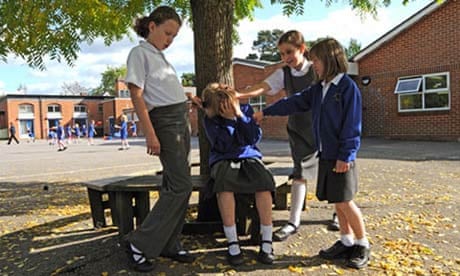Bullying is now the most common problem affecting young children, according to an analysis of calls made to the counselling service ChildLine. Last year the problem generated the largest number of calls from pre-teens, with many expressing concerns about friends they feared were being bullied.
The service's 25th annual snapshot, which paints an intimate picture of children's most pressing concerns, reveals that family conflict remains the biggest problem. There is some evidence that economic pressures are having an increasingly powerful effect on young people's mental health. Last year 13% of calls were from children who worried about family relationships, with many reporting that financial worries at home were causing rows.
ChildLine said it had carried out almost 40,000 counselling sessions relating to family relationship problems, up 18% on the previous year.
When it started a quarter of a century ago, the line received some 200,000 calls, most of them made by children calling from telephone boxes.
In her foreword to the report, ChildLine's founder, Esther Rantzen, notes that family problems did not figure in the top 10 issues when ChildLine was established. "We need to ask ourselves why children are so often so desperately unhappy at home that they find family life destructive, rather than the support it should be," Rantzen writes.
Sue Minto, head of ChildLine, suggested societal pressures were having an effect. "Families are a lot more mobile now," Minto said. "Support networks provided by grandparents and uncles and aunts aren't as accessible. And there is the issue of reconstituted families. With people divorcing, it makes it more difficult for children because dad's in one place and mum's in another."
Minto urged parents to talk to their children. "Make space for your children," she said. "Don't be so busy all the time that they can't talk to you."
The report reveals that last year the line received 1.5m appeals for help from children, with 270,000 requests made via email. It said bullying remains the second most common reason for children to contact ChildLine, with its counsellors carrying out 31,599 sessions relating to bullying, a rise of 4% on the previous year. Physical abuse was third, with self-harm rising rapidly up the rankings to come in as the fourth most common problem.
ChildLine's analysis of its calls suggests that bullying is affecting children at a younger age. Last year it was the chief concern for children aged seven to 11. As children get older, bullying becomes less of a concern, ChildLine found. In almost three out of five counselling sessions relating to bullying, children said the bullying took place in school or on the way home from school. And one in five expressed fears about physical bullying – with the issue a greater concern for boys than girls.
ChildLine said it had seen a 7% rise in the amount of counselling it was offering relating to cyberbullying. "Bullying has changed," Minto said. "Now it's online and 24/7. Twenty-five years ago children could escape, but now even if they don't go online or turn their phone off, they know when they go back on to a social network site it will be waiting for them."
The report suggests the support offered to bullied children is inadequate. "Many young people tell ChildLine that the support they receive from friends, teachers, parents and other trusted third parties is ineffective," the report states. "Some say that even if the bullying stops, they end up losing friends and still feel bullied, and many tell us that they don't ever talk about bullying as they are put under pressure to remain silent."

Comments (…)
Sign in or create your Guardian account to join the discussion